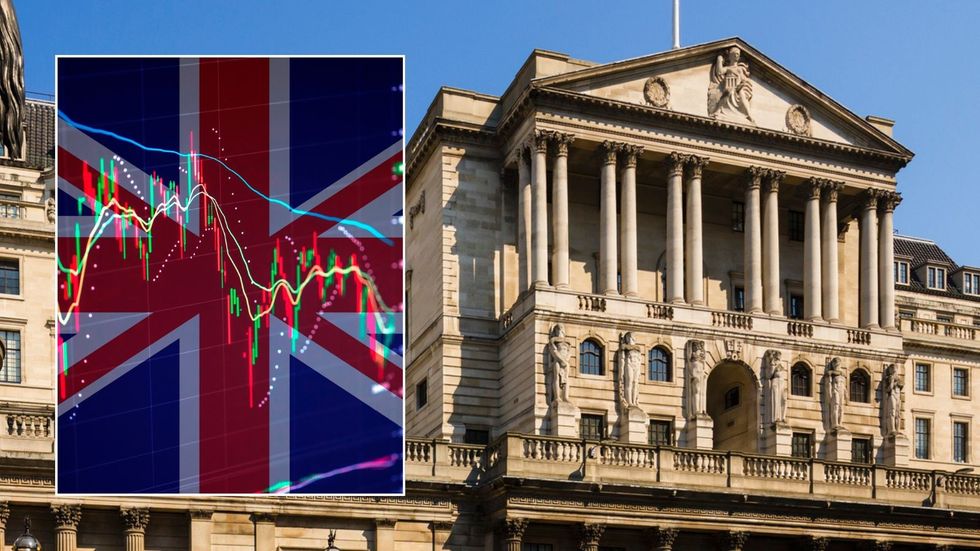One of the country’s biggest high street building societies is urging savers to take action following today’s shock inflation rise as £360billion continues to “sit idle in low-interest accounts”. Yorkshire Building Society has issued a warning to bank customers that they may be missing out on a sizable savings boost.
Figures published by the Office for National Statistics (ONS) earlier today revealed that the consumer price index (CP) rate for the 12 months to November 2024 jumped to 2.6 per cent, an increase from the 2.3 per cent the month before.
This is higher than the Bank of England’s desired inflation target of two per cent, however remains significantly lower than the 11.1 per cent reported for October 2022. Over the last three years, the central bank’s Monetary Policy Committee (MPC) has voted to raise the nation’s base rate in an attempt to ease inflation.
Previously reaching a 16-year high of 5.25 per cent, the Bank has recently slashed the rate to 4.75 per cent. The base rate sets what the Bank of England pays commercial banks that hold money in the financial institution.
As such, it influences the interest rates those banks charge people to borrow money or pay on their savings. While mortgage holders and people in debt have struggled under high interest rates, savings accounts have benefited from this trend in recent years.
Do you have a money story you’d like to share? Get in touch by emailing [email protected].

Yorkshire Building Society issues warning as £360bn savings boost ‘idle in low-interest accounts’
PA / GETTY
Analysts have called on Britons to switch to more competitive accounts with higher rates attached if they continue to receive diminished returns on savings from their bank and building society.
During periods of high inflation, money experts have sounded the alarm that a soaring CPI rate could erode hard-earned savings if cash remains trapped in low interest accounts.
Chris Irwin, the director of savings at Yorkshire Building Society, broke down the incentives of bank account switching to ensure customers see their money go further.
He explained: “The rise in inflation to 2.6 per cent is a stark reminder of the financial pressures families face daily. Growing up in a household where every penny counted, I know how difficult it can be to make ends meet, especially when essentials like housing, fuel, and clothing costs continue to climb.
“For instance, household services rose by 3.5 per cent in November, while food and drink prices surged further, leaving many families feeling squeezed. These figures highlight the importance of not only managing inflation but also empowering families to take control of their finances.
“With over £360billion still sitting idle in low-interest accounts, there’s a huge opportunity for households to improve their financial resilience by switching to higher-interest savings products.
“The data shows that even modest savings can make a difference—82 per cent of regular savers achieved homeownership within a decade, compared to just 15 per cent of non-savers.”
The savings expert urged the Government, banks and building societies to do more to promote the benefits of swapping to more competitive accounts while interest rates remain high.
Irwin added: “Encouraging people to switch savings accounts, access better rates, and build small, regular savings habits will be critical. Behind these statistics are real people looking for practical ways to secure their financial futures—we need to meet them with solutions that work.”
Caitlyn Eastell, a spokesman at Moneyfactscompare added: “Top deals across the fixed market have experienced minor fluctuations since the previous inflation announcement, bringing some welcome stability.”
LATEST DEVELOPMENTS:

The Bank of England will make its next base rate announcement tomorrow
GETTY
“Meanwhile, a handful of new providers have entered the scene, which is positive news in terms of competition and for savers willing to switch to challenger banks, who will have their own pricing strategies.
“Easy access rates were among those receiving the most notable cuts, seeing a 0.10 per cent reduction, but this is unsurprising given last month’s cut to base rate; however, a slew of providers currently offer the top-paying rate.
“Savers would be wise to take advantage of a competitive savings market and seek the highest-paying deals. [They] should avoid waiting to pull the trigger on any enticing deals until the new year to avoid disappointment.”
The Bank of England’s MPC will make its next announcement regarding interest rates tomorrow (December 19) at 12pm.